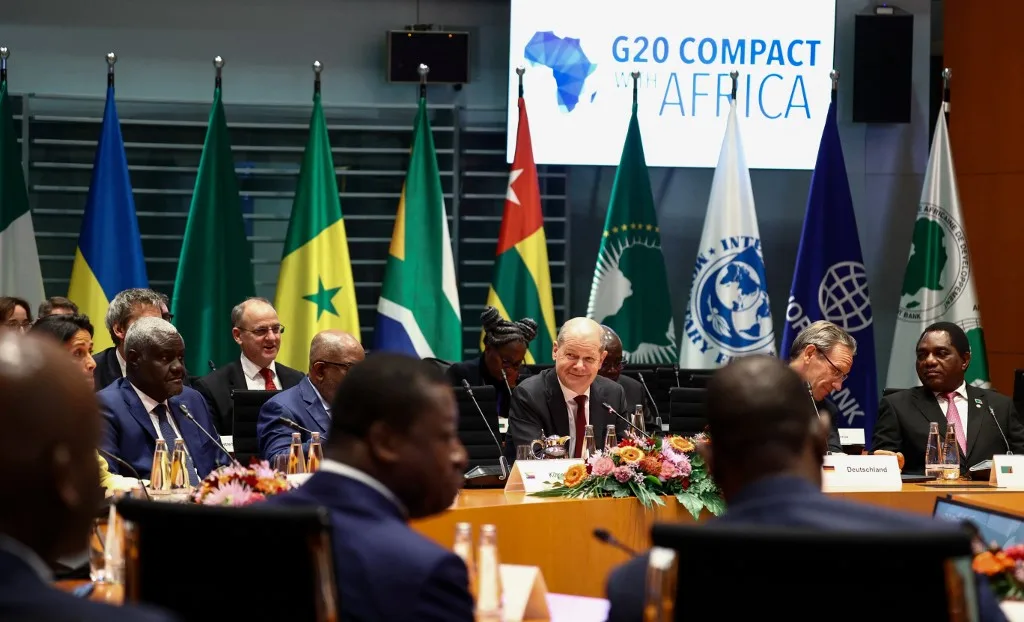Germany signed a $500m renewable energy and gas deal with Nigeria and pledged to invest €4bn ($4.3bn) in African green energy projects by 2030 at the G20 Compact with Africa (CwA) Conference in Berlin this week.
The conference, hosted by German Chancellor Olaf Scholz, and attended by some 18 African leaders, aimed to attract increased private investment in Africa and further political dialogue between the G20 and African countries.
At a time when China and Russia are attempting to secure geopolitical influence in Africa and access to the continent’s critical natural resources, it was an opportunity for Germany and other European countries to extend their influence on the continent. European leaders such as President Macron of France and the president of the European Commission, Ursula von der Leyen, were also in attendance.
The CwA was set up during the German G20 presidency in 2017, with the aim of attracting increased private investment in African member states through substantial improvements in their macro, business and financing frameworks. Benin, Burkina Faso, Côte d’Ivoire, Democratic Republic of the Congo, Egypt, Ethiopia, Ghana, Guinea, Morocco, Rwanda, Senegal, Togo and Tunisia are currently members. Other G20 partner countries such as Nigeria also attended the conference.
Michael Staak, chair of political sciences at Helmut Schmidt University in Hamburg and expert on German foreign policy in Africa, tells African Business that CwA was designed “with Germany wanting to present itself as a reliable and attractive partner for African countries” and bring African countries closer to the West.
However, during the summit, the president of the Comoros and chair of the African Union, Azali Assoumani, explicitly defended China’s influence in Africa and said “there is no monopoly… everyone has a place.”
Opportunity for Europe
Teniola Tayo, trade policy fellow at the Africa Policy Research Institute in Berlin, believes that there is an opportunity for Europe to fill the void left by China’s decreasing exposure to Africa. She notes the summit “comes at a time when Chinese official loans and commitments to sub-Saharan Africa are said to be close to a 20-year low.”
That said, Tayo adds that the onus is ultimately on African leaders to determine which partners are the most beneficial for the continent. “As African stakeholders, we need to do the work of figuring out who is best placed to offer what, and how we can navigate their interests to get the things that we need – all while shaping partnerships that are not one-sided, but mutually beneficial.”
Fikayo Akeredolu, a researcher in Sino-African political economics, agrees that the CwA is “definitely an opportunity to foster closer European-African relations”, and says that if used effectively, it can bring both regions closer together. However, she argues that “the G20 and Europe within it need to focus on building relations with Africa in a removed context from China.”
“Africa needs to be viewed as a region with agency, so European leaders must foster relations on the continent regardless of what China is doing,” Akeredolu adds. “Competition with China cannot be the only reason for wanting more influence on the continent.”
Akeredolu also suggests that, if Europe is serious about becoming a more important partner for Africa, the continent should “move from talk to action” and bring forward substantial proposals that will benefit African countries.
“This current climate is particularly interesting for Europe because of the Global Gateway Strategy, which is supposed to counter China’s Belt and Road Initiative,” she says. “Europe continues in its push to compete with China on the African continent, but there is some scepticism around how effective this push is and will be.”
Lack of harmony
Staak is similarly sceptical about whether Germany and Europe will be successful in their attempts to reshape the geopolitical picture in Africa.
“It is not clear to what extent Germany will take the agenda of African countries into consideration,” he says. “For example, all African countries demand a new global financial architecture less dominated by the West. From their point of view, fair and transparent access to the European market is not guaranteed today.”
Staak also suggests the summit itself is a flawed idea which is likely to yield few results in the long run. “Big infrastructure projects are not included in the Compact with Africa portfolio. Nigeria’s president states that the Compact with Africa initiative started 10 years too late. Unfortunately, the Federation of West Africa Chambers of Commerce and Industry, and similar representatives of African entrepreneurship, did not even receive an invitation to the summit,” he says.
“So far, African and European interests are partly addressed but not really harmonised.”
Want to continue reading? Subscribe today.
You've read all your free articles for this month! Subscribe now to enjoy full access to our content.
Digital Monthly
£8.00 / month
Receive full unlimited access to our articles, opinions, podcasts and more.
Digital Yearly
£70.00 / year
Our best value offer - save £26 and gain access to all of our digital content for an entire year!

 Sign in with Google
Sign in with Google 



